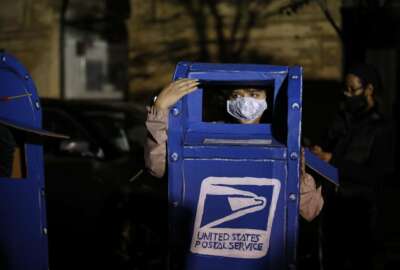To listen to the Federal Newscast on your phone or mobile device, subscribe in PodcastOne or Apple Podcasts. The best listening experience on desktop can be found using Chrome, Firefox or Safari.
- President Joe Biden is nominating Christine Wormuth as the next Army secretary. If confirmed, she’ll be the first woman to hold the job. Wormuth formerly served as the undersecretary of defense for policy, before that she was appointed deputy undersecretary for strategy, plans and force development. Some lawmakers are already championing her nomination. Representative Anthony Brown (D-Md.) said Wormuth has the experience and knowledge necessary to lead the United States Army through complex and multifaceted challenges.
- The Department of Homeland Security is giving the rest of its workforce priority eligibility for the COVID-19 vaccine. DHS is already vaccinating frontline employees through a partnership with the Veterans Health Administration. But the department gave the rest of its workforce letters last week that they can present these letters to local vaccine providers as proof of priority eligibility. Most states have already opened up vaccine eligibility to anyone over the age of 16. But the DHS letters will allow all employees to get vaccinated now before eligibility expands to everyone across the country next week. (Federal News Network)
- President Biden is filling out his team at the Department of Homeland Security. John Tien is Biden’s pick to be the deputy DHS secretary. Tien previously served as a member of the National Security Council during the Obama administration. Ur Jaddou is Biden’s nominee to lead U.S. Citizenship and Immigration Services. Jaddou is an adjunct law professor at American University and was chief counsel for UCIS back in 2014. Chris Magnus is the president’s pick for Customs and Border Protection. He’s the current police chief for Tuscon, Arizona.
- The White House details its nominees for two key cybersecurity roles. Chris Inglis and Jen Easterly will be nominated to cybersecurity positions to oversee federal networks and work closely with the private sector. Inglis would be the first national cyber director in the White House. Easterly would be the new director of the Cybersecurity and Infrastructure Security Agency or CISA in DHS. Inglis is the former deputy director of NSA. Easterly worked at NSA and in the White House during the Obama administration. Both positions require Senate confirmation. These two roles are among the last remaining key cyber positions that the Biden administration still needed to fill. (Federal News Network)
- Former Congressman Gil Cisneros (D-Calif.) is nominated at the Defense Department’s lead for personnel and readiness. Cisneros is a Navy veteran who served 11 years. In 2010 he won the Mega Millions lottery and used some of the proceeds to start charities focused on higher education. The undersecretary for personnel and readiness position has long been neglected in DoD. Over much of the last eight years it has been unfilled by a Senate confirmed manager. (White House)
- Among President Biden’s picks for top leadership roles was Anne Milgram to lead the Drug Enforcement Administration. Milgram was Attorney General for the state of New Jersey from 2007 to 2010. She was also a federal prosecutor with the Justice Department, where she became Special Litigation Counsel for the prosecution of human trafficking crimes.
- A crucial moment for the Department of Veterans Affairs and its multi-billion-dollar electronic health record program. VA employees say the department’s initial rollout at the first site last fall was far less successful than the agency originally touted. And the EHR continues to frustrate some VA clinicians who struggle to fill prescriptions or make referrals to the community. VA launched a strategic review of the EHR program last month. But Congress is worried it won’t take the time it really needs to resolve lingering usability issues. (Federal News Network)
- The Departments of Housing and Urban Development and Veterans Affairs say they’re mobilizing the strength of their agencies to address an uptick in veteran homelessness. HUD’s annual assessment found over 37,000 homeless veterans on a single night in January 2020. The number is likely higher today because of the pandemic. VA and HUD say their employees will evaluate existing homelessness prevention strategies and come up with a new plan. The VA and HUD secretaries will participate in listening sessions with homeless veterans and other stakeholders. The departments say they’ll also mobilize others within the Interagency Council on Homelessness.
- The issue of military hunger has been under the radar for years, now some lawmakers are taking notice. A new report from MAZON, an organization fighting hunger, says military families are slipping through the cracks of the United States’ safety net. Housing subsidies given to service members are counting them out of food stamp benefits, but families are still going hungry. A bipartisan group of representatives recently introduced a bill that would give a basic allowance to troops who need help with food and are not eligible for federal nutrition assistance. Two senators are also calling on the Biden administration to rethink how military benefits are taken into account for assistance. (Federal News Network)
- Two efforts to improve how agencies assess vendor performance on contracts will come to a crucial point this year. DHS is testing technologies from five vendors to see if artificial intelligence can reduce the burden and improve the data of contractor assessments. GSA, meanwhile, released a new memo encouraging the use of self-assessments by companies. Both initiatives will help prove whether contracting officers and vendors truly want improved ratings in the Contractor Performance Assessment Reporting System. (Federal News Network)
- The Postal Service maintains high approval ratings, despite last year’s pandemic challenges. A survey from its inspector general found 91% of respondents held a positive opinion of the agency. That approval rating is consistent with approval ratings in surveys from 2017 and 2019. Despite the pandemic’s challenges, 75% of respondents said USPS provided excellent customer service in 2020, a 7% increase from the year prior. USPS is considering cutting some post office hours as part of its 10-year reform plan. But survey respondents said they still preferred handling their postal needs in-person. (Federal News Network)
- President Joe Biden is working with the heads of 19 major companies to ramp up the supply of semiconductors and increase supply chain resilience. Executives in the national defense, technology and automotive industries met with the president at a virtual summit, along with National Security Advisor Jake Sullivan and Commerce Secretary Gina Raimondo. Biden says supply chain resilience factors heavily into his 2022 budget plan and $2 trillion infrastructure plan.
Copyright
© 2025 Federal News Network. All rights reserved. This website is not intended for users located within the European Economic Area.





